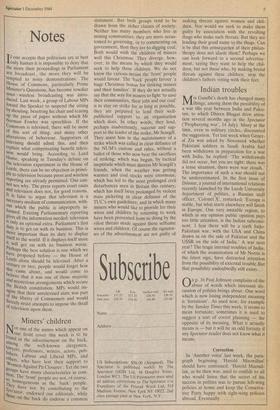Miners' children
None e of the names which appear on our front cover this week is to be found in the advertisement on the back, among the well-known clergymen, SwYers, professors, writers, actors, pub- hers, Labour and Liberal MPs, and others, who have lent their support to 'Women Against Pit Closures'. Yet the two groups have many characteristics in com- mon. The 'front' people are not, of course, S°, homogeneous as the 'back' people. They have not, by contributing to the Spectator, endorsed our editorials, while `nose on the back do endorse a common statement. But both groups tend to be drawn from the richer classes of society. Neither has many members who live in mining communities: they are more accus- tomed to governing, or to commenting on government, than they are to digging coal. Both would wish the children of miners well this Christmas. They diverge, how- ever, in the means by which they would seek to help these children. We do not know the various means the 'front' people would favour. The 'back' people favour 'a huge Christmas bonus for striking miners and their families'. If they do not actually say that the way for miners to fight `to save their communities, their jobs and our coal' is to stay on strike for as long as possible, they are prepared to lend their well- publicised support to an organisation which does. In other words, they lend, perhaps inadvertently, succour and sup- port to the leader of the strike, Mr Scargill. They assist him in the maintenance of a strike which was called in clear defiance of the NUM's custom and rules, without a ballot of those who now bear the sacrifices of striking; which was begun, by tactical ineptitude which must distress Mr Scargill's friends, when the weather was getting warmer and coal stocks were enormous; which has led to the most prolonged civil disturbances seen in Britain this century; which has itself been prolonged by violent mass picketing in clear defiance of the TUC's own guidelines; and in which many miners who would like to provide for their wives and children by returning to work have been prevented from so doing by the vilest threats made against those selfsame wives and children. Of course the signator- ies of the advertisement are not guilty of making threats against women and chil- dren. Nor would we seek to make them guilty by association with the revolting thugs who make such threats. But they are lending their good name to the thugs. Can it be that this consequence of their philan- thropy does not alarm them? Perhaps we can look forward to a second advertise- ment, saying they want to help the chil- dren, but not those who, by making brutal threats against these children, stop the children's fathers voting with their feet.






















































 Previous page
Previous page